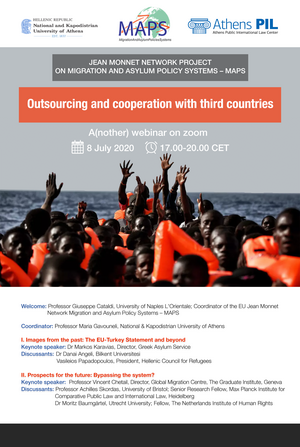WEBINAR: OUTSOURCING AND COOPERATION WITH THIRD COUNTRIES

The purpose of this webinar is to identify the key pressure points in outsourcing migration control and management to third States and, to this end, assess the various forms of cooperation with third States, drawing upon the expertise of invited speakers and the workshop participants.
It is evident more than ever in recent years that Europe, including the European Union and its Member States, is moving towards the externalization of immigration control employing a range of practices designed to impede movement and prevent people leaving the State they are in and their irregular arrival at state frontiers. To this end, destination States utilise a range of measures, sometimes unilaterally and frequently in cooperation with other States or non-State actors, including carrier sanctions and visa policies – an approach aptly coined as ‘contactless control’.
This outsourcing exercise involves also the actual management of asylum applications, including refugee status determination and asylum screening procedures in States of transit, in particular at pre-selected checkpoints. The very recent judgments of the European Court of Human Rights in the NT and ND v Spain and the MN v Belgium casesshowcase the significance of having (or not having, as the case may be) such pre-identified check-points either at the actual borders or at consulates or other outposts catering to both the asylum process and human rights protection needs. Both these landmark cases mark a potential paradigm shift from protection to regulated access or no access to extraterritorial asylum in Europe.
In addition, or alternatively, a network of bilateral agreements is concluded with a view to ensuring an effective management of migratory routes and allocation of responsibilities between transit and destination States, which is coupled with the traditional mechanism of readmission agreements. Among such cooperative agreements on allocation of responsibilities stands the EU-Turkey Statement of March 2016, the deficiencies of which have generated a veritable deluge of literature but little practical results.
Perched between questionable past practice and hesitant prospects for the future, such outsourcing and cooperative mechanisms raise a host of legal questions as they may interfere with human rights and refugee law and involve very challenging questions of extraterritorial application of human rights and shared international responsibility.
Against this background, the workshop will endeavour to unpack some of the main challenges of such policies and practices in the European context. It will evolve on two primary questions, one relating to the experience gained from such practices to date and the second attempting to identify pathways to the future. At the starting point of each one a keynote speaker will set out the main points of contention and react to specific questions raised by designated discussants in an interactive albeit structured discussion. Members of the MAPS Network are particularly welcome to intervene.
The proceedings will be streamed live on Facebook through the MAPS and Athens PIL websites. Keynote speakers, discussants and participants are welcome to contribute a blog-size paper to the website of the project.
Click here to download the programme in pdf.